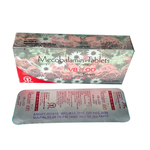gb
Introduction to gb
Gb is a medication used to treat various joint and bowel conditions. It is particularly effective for severe forms of arthritis and ulcerative colitis. Gb helps manage symptoms by reducing inflammation in the body.
Composition of gb
The active ingredient in gb is Tofacitinib, which works by inhibiting specific enzymes known as Janus kinases (JAKs). These enzymes play a role in the body's inflammatory and immune responses.
Uses of gb
- Treatment of severe rheumatoid arthritis
- Management of psoriatic arthritis
- Relief for ankylosing spondylitis
- Control of severe ulcerative colitis
- Used in children over two years with juvenile arthritis
Side effects of gb
Common side effects:
- Headaches
- Nausea
- Diarrhea
- Abdominal pain
Serious side effects:
- Infections like pneumonia or shingles
- Vomiting
- Acne
Precautions of gb
Before starting gb, inform your doctor if you have any infections, liver disease, or a history of cancer, heart issues, or blood clots. Avoid using gb if you have severe liver disease or hepatitis B or C. If you smoke, discuss this with your healthcare provider as it may affect your treatment.
How to Take gb
- Take 5 mg twice daily for immediate-release tablets.
- For extended-release tablets, take 11 mg once daily.
- Swallow extended-release tablets whole; do not crush, chew, or split them.
Conclusion of gb
Gb is a valuable medication for managing severe joint and bowel conditions. By understanding its uses, side effects, and precautions, patients can effectively incorporate gb into their treatment plan under the guidance of a healthcare professional.
Similar Medicines
Disclaimer : This information is not a substitute for medical advice. Consult your healthcare provider before making any changes to your treatment . Do not ignore or delay professional medical advice based on anything you have seen or read on Medwiki.
gb
Prescription Required
Manufacturer :
West-Coast Pharmaceutical Works LtdComposition :
methylcobalamin





















.svg)
